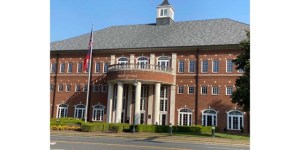Young voters show loyalty to campaign’s outsiders
Published 9:44 pm Sunday, February 28, 2016

- Regional library director to retire
ATLANTA — Jessie Singley’s concerns about her chances in the job market and the rising national debt have pushed the first-time voter toward a presidential candidate who vows to run the country radically differently than what she’s seen in her lifetime.
Wearing a Donald Trump T-shirt, Singley, 18, from Henry County, waited in line recently outside the Georgia World Congress Center in downtown Atlanta so that she could join the thousands of people who’d come to hear the brash Republican front-runner.
Trending
“Young people are worried about their future,” she said.
Had the billionaire real estate developer not joined the presidential race, Singley said she sees an attractive alternative — Sen. Bernie Sanders, the self-described democratic socialist from Vermont.
Trump and Sanders might seem like contradictory choices.
Not for young voters, and not in this election.
Young voters like Singley are drawn to the outsider candidates in such great numbers that, political observers say, motivated millennials have already swayed the outcomes of some early primaries.
“This is a strange year and a strange election, and the millennials are adding to that anti-establishment voting approach,” said Bernard Tamas, assistant professor of political science at Valdosta State University.
Trending
In Iowa, for example, a surge in support from voters between ages 18 and 29 put the caucus within Sanders’ reach, according to an analysis of media exit poll data by Tufts University’s Center for Information and Research on Civic Learning and Engagement.
Sanders lost by a whisker in the Iowa caucuses to former secretary of state Hillary Clinton.
But in New Hampshire, young voters helped Sanders end the night with a commanding lead over Clinton. All said, 83 percent of young voters backed him, according to exit polls.
Trump, meanwhile, drew 37 percent of the youth vote in New Hampshire’s GOP primary.
Trump and Sanders “represent a procedural shift away from the norm,” said Jesse Jaime, president of the Young Democrats of Valdosta State University and a Sanders supporter. “And I think that resonates with younger voters,” he said.
Eliot Arno, a student at Kennesaw State University, sees it differently.
“Millennials are idiots. We’re uninformed. We go with the guy who barks the loudest,” he said as he waited to hear his preferred candidate, Ohio Gov. John Kasich, speak on KSU’s campus recently.
To their credit, millennials harbor deep distrust of government, having lived through the Bush and Obama administrations, Arno said.
Even so, polls show that young voters don’t always chart their own course.
A recent survey suggests that young Georgians will likely vote similarly to older citizens on Tuesday.
Among Democrats under age 40, Clinton commands the support of 67 percent, according to a Landmark/Rosetta Stone poll. Among all Democrats surveyed, 72 percent picked Clinton.
Georgia’s Republicans under age 40 are also likely to go along with their older counterparts and choose Trump.
The poll, released a week ago, showed one-third of likely young GOP voters behind Trump. U.S. Sen. Ted Cruz of Texas was a distant second with 23 percent.
That mirrored broader sentiment toward Trump, though older voters tend to favor U.S. Sen. Marco Rubio of Florida over Cruz.
Those patterns, of young voters following older ones, diverge from the trends set in some early-voting states, where young citizens were less likely to follow along.
Until now, younger Republicans have been less inclined to support Trump. He’s only won the youth vote in one early-voting state, New Hampshire.
Tamas said younger voters, including those who identify as Republican, tend to be more politically independent and socially progressive.
That, he added, may cause Trump to lose the millennial voter on matters related to diversity.
“I’m not sure how much issues like putting up a wall on the Mexican border would appeal to them,” he said.
Regardless of whom they choose, young Republicans have been coming out in record numbers in early-voting states. Nevada’s GOP caucus was the fourth consecutive primary where young Republicans participated in record numbers.
“If they continue to vote differently, and turn out in much higher numbers than before, they really can throw some weight around,” said Kei Kawashima-Ginsberg, director of the research center at Tufts. “It all depends on the turnout.”
Georgia’s youth will have to show up at the polls, too, she added, to have that kind of influence. About 18 percent of Georgia’s 4.7 million registered voters are between the ages of 18 and 29.
Recognizing the youth vote’s potential, presidential candidates have targeted millennials during swings through Georgia.
Kasich, for example, brought his sunny message to Kennesaw State. Sanders took his call for revolution and income equality to Morehouse College. Trump will deliver his fiery stump speech at Valdosta State this Monday.
Candidates have also ramped up efforts to appeal directly to voters through social media.
Trump, in particular, has gained a significant following with his brand of blunt, unfiltered posts on Twitter.
“I love this tweeting. It’s like owning The New York Times without the losses,” he said at his recent Atlanta rally.
Young voters were well represented at Trump’s stop in Atlanta, but it’s unclear how much of a factor they’ll be on Tuesday.
Millennials are generally less likely than older voters to actually show up on Election Day, according to political observers.
Take Chase Moore, 22, of Atlanta, Singley’s friend who said he intended to cast a ballot for Barack Obama in the last presidential election.
He never made it to the polls.
Nothing, he said, will thwart his plans to vote for Trump this time around, though.
“He ain’t afraid to speak his mind,” Moore said. “He doesn’t have outside investors donating money (so they) can tell him what to say. He says what he wants to. He’s a boss.”
Even the Republican Party does not fully embrace Trump, noted Moore — which adds to the appeal.
Jill Nolin covers the Georgia Statehouse for CNHI’s newspapers and websites. Reach her at jnolin@cnhi.com.





